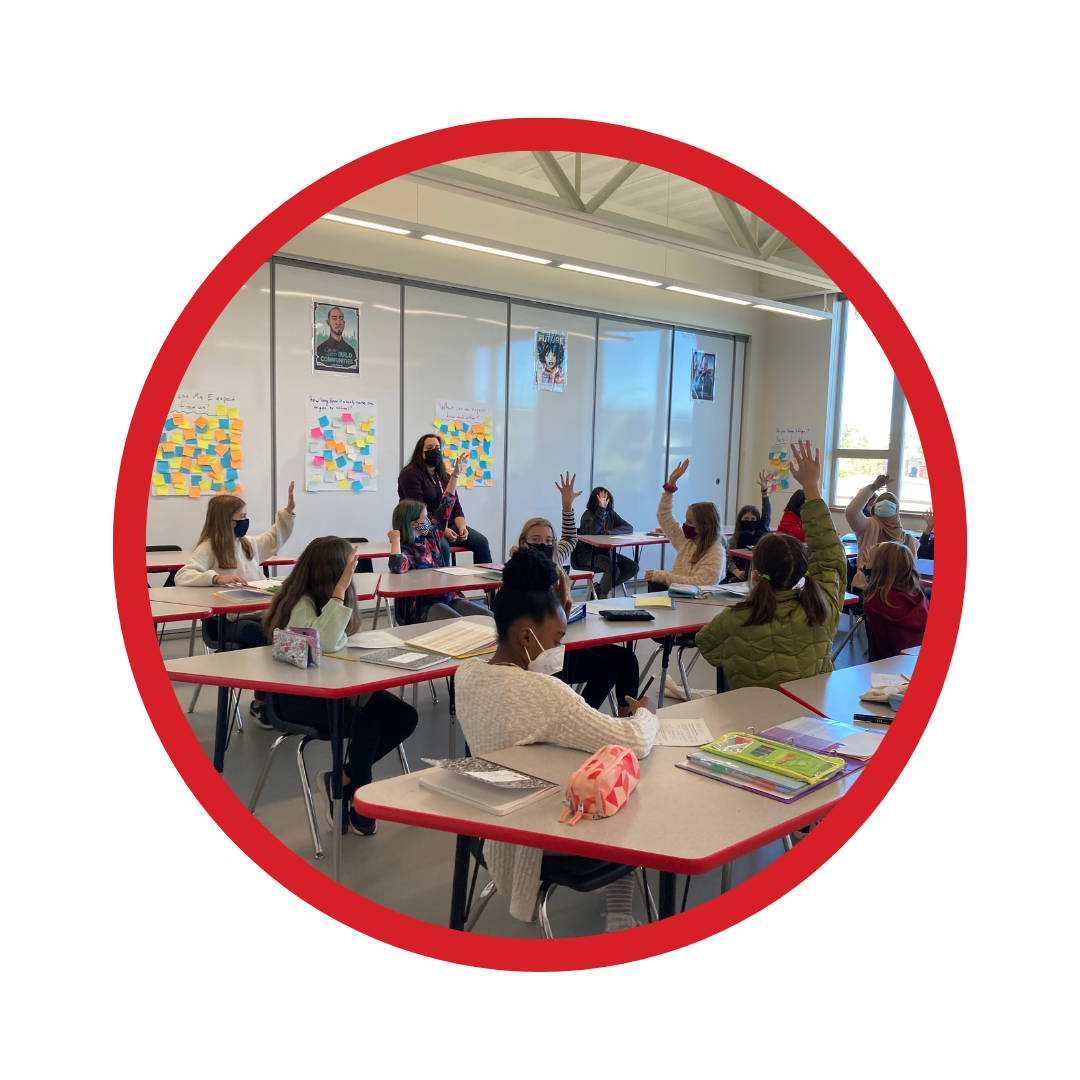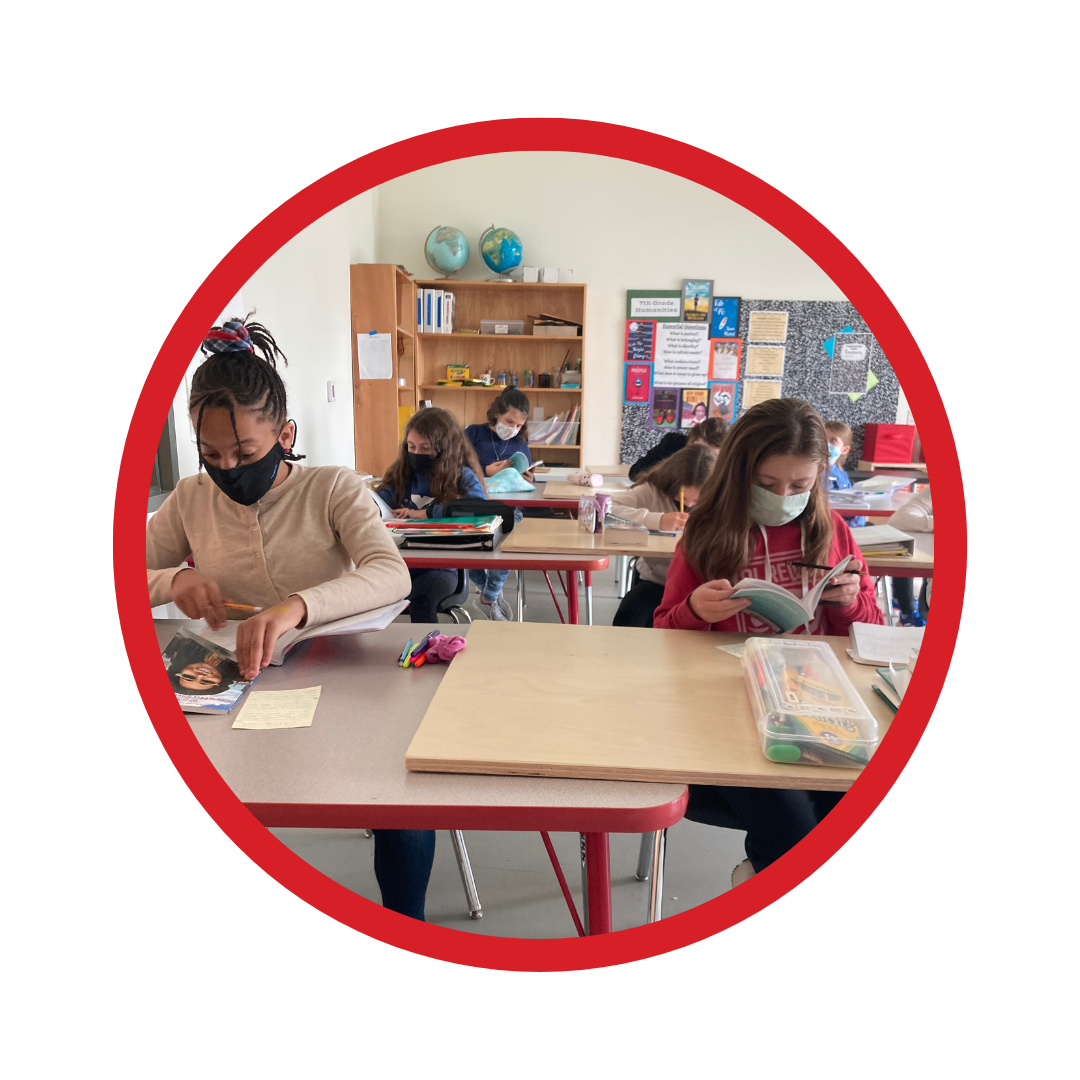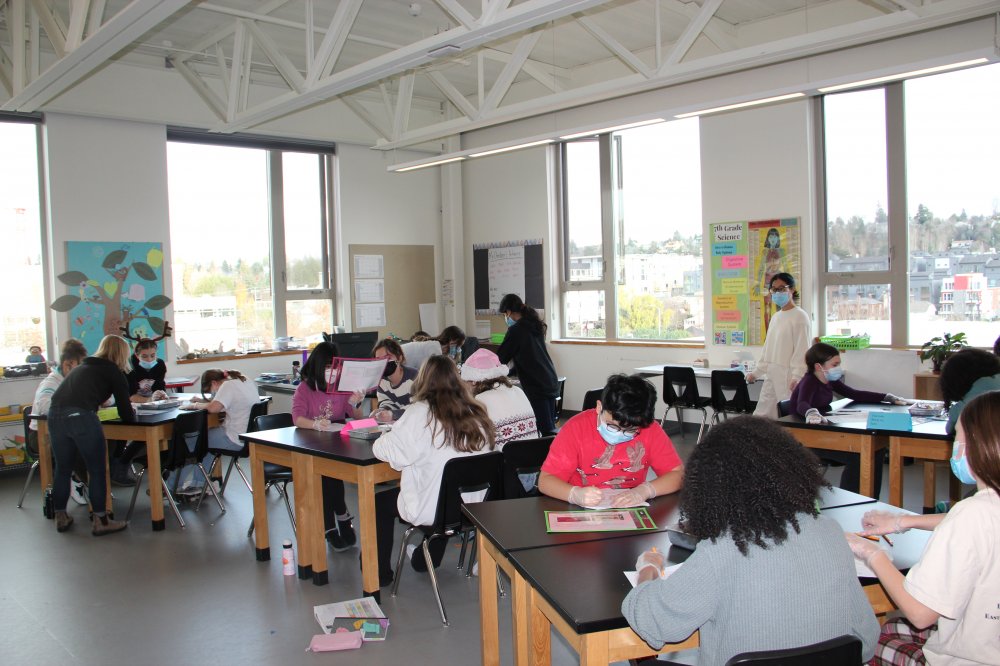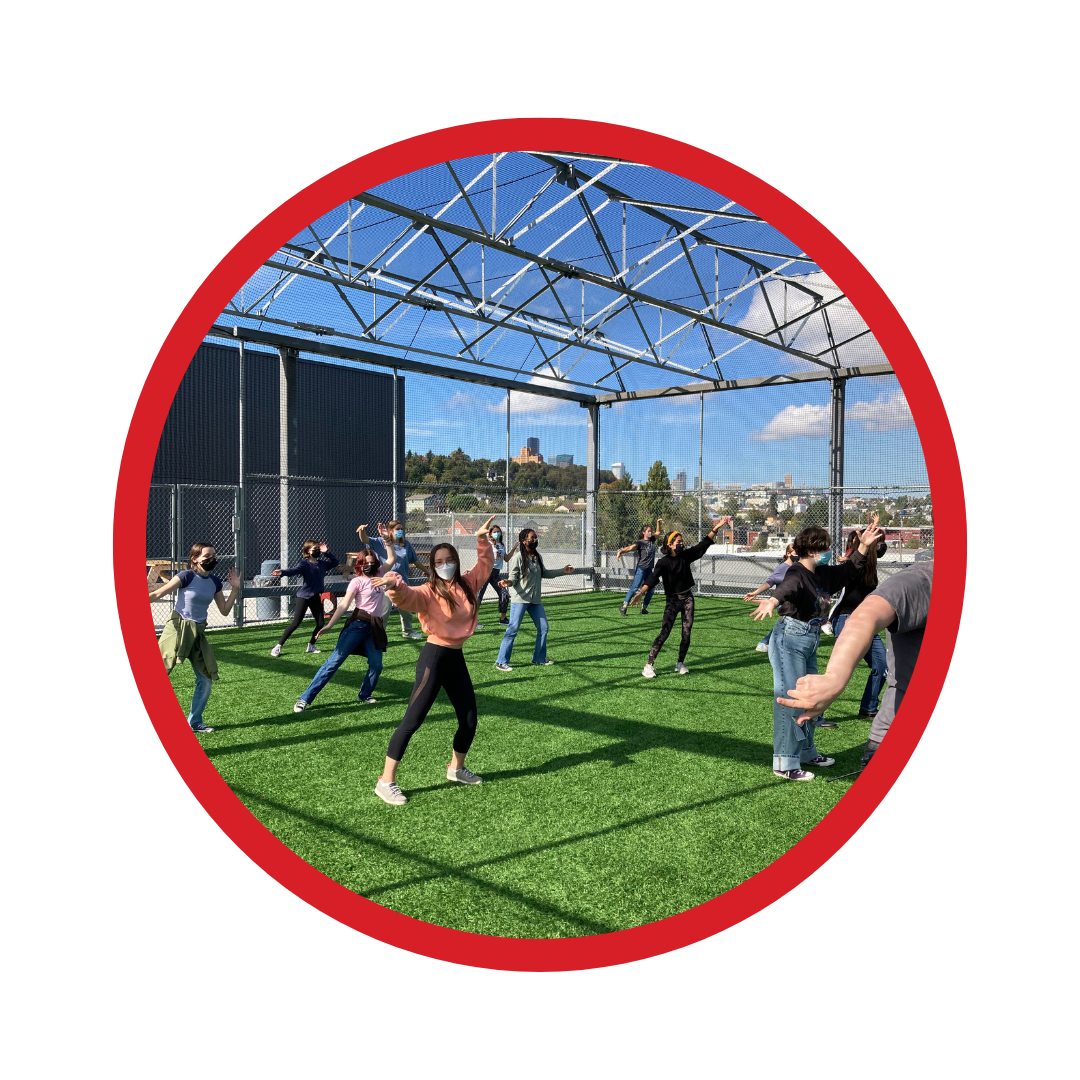7th Grade at L-Dub
The seventh grade Language Arts class is designed to begin with students asking themselves “who am I?” This theme reverberates in both the literature students read and the writing students produce. The course emphasizes the importance of clear writing and close reading. Students write to convey ideas, using academic writing as well as personal writing to develop critical thinking skills and to discover more about themselves. Using the writing process, students communicate those understandings clearly and creatively while learning and applying grammatical and mechanical rules to their writing. Active reading skills are utilized in all texts as students annotate what they read in order to prepare for frequent discussions. By the end of the course, students begin to ponder where their voices fit into the landscape of literature.
ESSENTIAL QUESTIONS
- How is writing an act of discovery?
- How and why do writers take risks in their writing?
- How do writers convey meaning?
- Why do people need to belong?
- What does it mean to grow up?
- What forms and informs our identities?
The course content focuses on world religions as students explore the development of culture in world history. Beginning with ancient religions of Hinduism, Buddhism, and Confusiansim, students explore the ideas of how religions develop and meet the needs of human experiences.
Using the Abrahamic faiths of Judaism, Christianity, and Islam, students engage in comparative studies of how religions are connected to each other while remaining distinct aspects of cultures and civilizations. Finally, through an examination of Pacific Northwest Native Tribes, seventh grade investigates the role of spirituality and religion in indigenous societies. The social studies curriculum teaches and practices skills in reading comprehension, writing, oral presentations, study techniques, and research assignments. Critical thinking skills are emphasized in all units especially when analyzing, examining, and writing about historical events. These analytic skills are honed with written assignments, group projects, oral presentations, and class discussions.
ESSENTIAL QUESTIONS
- What makes a civilization?
- What is the purpose of religion?
- What is power for?
- What is justice?
- How is culture made?
Science at L-Dub is framed by the following four questions: How do scientists work together? How do scientists ask questions and find answers? How does science connect to your life? How do scientists make sense of "failure"?
Seventh-grade science focuses on the human body to enable students to develop systems thinking skills to understand the structures and functions of different body systems and how they interact to make us feel the way we do.
Students explore the major systems of the human body, including the nervous system, cardiovascular and respiratory system, digestive system, and study genetics and heredity, as well. They participate in a collaborative Science Symposium project focused on an investigation question of their choice. Students design a research question and procedure, collect and analyze data, and present their findings to the school community.
Each unit is centered around an essential question that students explore through lab investigations, simulations, readings and media, class discussion, and lecture. Throughout the year, students develop their skills in scientific modeling, data analysis, investigations, scientific argumentation, and scientific literacy. Students are assessed through unit quizzes, presentations, discussions, lab reports, in-class assignments, collaboration, and participation.
ESSENTIAL QUESTIONS
- Why do I get butterflies and sweaty palms when I’m feeling nervous?
- Why does a cut heal faster than our brain after getting a concussion?
- What does breathing have to do with how our muscles work?
- Why does a problem in the digestive system cause symptoms in other body systems?
- How do scientists effectively communicate research findings to others?
- Why do humans of most sexes have nipples?
- Why do individuals of the same species look different from each other?
At L-Dub, there are two pathways for seventh-grade math. The goal of our deeper seventh grade math class is to develop students’ understanding of proportional reasoning and the use of variables to represent mathematical relationships. Students work on developing their numeracy skills through continued practice with rational numbers, including positive and negative whole numbers, fractions, and decimals. They will then use these skills to make sense of proportional relationships. Working with these concepts will prepare students for the challenges of the abstract concepts found in algebra, and eventually, geometry courses. The accelerated seventh grade math class also spends time addressing many Algebra skills, with an eye toward preparing students to take an accelerated eighth grade course which includes topics in Geometry and Algebra. Students will be assessed using regular exit tickets, checkpoints, and quizzes. Assessments in the form of tests and projects will occur in each unit.
ESSENTIAL QUESTIONS
- How is thinking algebraically different from thinking arithmetically?
- What are different ways I can represent quantities and relationships?
- How do I use proportions to compare and relate quantities?
- How do I compare and communicate number relationships?
- How do effective problem solvers tackle a problem, maintain awareness of their own practice, and know what to do when they get stuck?
- How do I know and describe when a result is reasonable?
- How can I communicate and justify my mathematical ideas effectively?
- How can I use numbers to describe the world around me?
The LWGMS STEAM (Science, Technology, Engineering, Art, and Math) curriculum seeks to produce creative problem-solvers who are undeterred by failure. STEAM class is designed not only to excite students about engineering, technology, science, and math but also to allow them to apply their knowledge of those disciplines in a creative, hands-on way. In STEAM class, students collaborate with their peers to solve design challenges and build prototypes, developing their interpersonal and project management skills. Projects feature design thinking, coding, robotics, woodshop, maker space tools, and circuitry. Students are assessed on their final product, reflections on and engagement in the design and building stages, collaboration, and participation.
ESSENTIAL QUESTIONS
- Why is failure a good thing?
- How can I use data and feedback to inform ideas and solutions?
- How can I solve problems creatively?
- What do I learn by collaborating with others?
In seventh grade, students continue to develop communication skills and deepen their understandings of both why learning a language is important and how to work toward language acquisition. Instruction is based on a Comprehenisble Input model where students are first asked to show understanding of language they read and hear and then with stepped practice, coaching, and feedback learn to produce similar language. Students engage with authentic sources as well as those designed for language learners including co-created stories. The class covers thematic units that are important to and engaging for novice and intermediate learners. Students learn to communicate about school, and professions, physical appearance, and food. They also practice extending language used to describe people, preferences, settings and places. Additional thematic units vary by the year and include current events, music, culture and history. Students read a comprehensible novel about environmental issues and learn to communicate about themes related to the book. Class is conducted 75%-85% in Spanish. Students practice and are assessed in all four modes of communication: reading, listening, writing, and speaking.
ESSENTIAL QUESTIONS
- What are proficiency and language acquisition?
- What strategies and resources help me learn another language (in the community and on my own)?
- How do I feel empowered in my language journey?
In this course, students will learn to use a variety of art tools and techniques, as well as explore the elements of art and principles of design to create original works of art with a focus on both process and product. Furthermore, students will learn about art history and develop a vocabulary to discuss and critically examine works of art and make connections to the world around them. Throughout the year, students will work with ink, pencil, sculpture, fiber, paint, and printmaking. Students will also engage in a feedback process to give thoughtful and constructive feedback to peers, and apply feedback as they develop their own artworks. At the end of the year, student work is displayed at the annual art show. Students are assessed on craft, feedback, production, and learning behaviors.
The Theatre Arts program at LWGMS is an opportunity for students to work together as they build strong voices, strong minds, and strong bodies. Through script analysis, interpretation, and memorization, students develop strong minds; by learning to perform on stage, students develop strong voices; and finally, through learning to use physical movements to express emotion and meaning, students develop strong bodies.
The Theatre Arts program also provides opportunities for students to practice teamwork and leadership skills. As members of a cast and crew, the students must learn to work together and be responsible on both an individual level as well as for the entire group. In addition to performing as actors, students take on leadership roles in stage management, lighting, sound, set design, assisting the director, and choreographing musical numbers. Through two one-act shows, seventh-grade students take ownership in both the acting and technical aspects of the production and perform for the school community. The seventh-grade productions rely on teamwork and peer support for success; consequently, with every show, the students learn to work cohesively and collaboratively. The process of creating a show is filled with opportunities for social and emotional learning and the personal growth that results from meeting challenges and taking appropriate risks. Students are assessed based on their mastery of basic theatre skills such as memorization, projection, dictation, and audience awareness.
Our Mind, Body, Voice class will be taught as a trimester class. The seventh grade students will take the MBV during their second trimester. During the MBV course, each student will have the opportunity to build community, learn age appropriate content on mental health and stress management, adolescent brain development and executive functioning, healthy relationships and boundaries, media literacy and online presence, gender and sexuality, sexual health, and puberty. Classes will be a combination of lectures, group discussions, and individual journal entries.
The goal of the physical education (PE) program is to help develop strong, confident, and well-balanced individuals. Students participate in a variety of physical activities and learn the role movement plays in their overall health and well being. Each grade level will progress from basic large motor skills to smaller motor skills utilizing more compound movements. Seventh grade is expected to learn form, body awareness, and a basic understanding of healthy behaviors. Students will be able to demonstrate and explain various activities and the role these movements play in building and maintaining healthy lifestyles, while creating and tracking their individual goals. Students are assessed on learning behaviors in daily lessons as well as on the overall progress they have made for each skill.
L-Dub offers a variety of electives based on student interest and teacher expertise. The goal of the enrichment program is to provide students with skills and opportunities beyond their regular academic program. The design of the enrichment program reflects the belief that students should have choice in their learning and opportunities to explore and expand their individual interests, skills, and passions. The enrichment classes are often project-based, and they allow students to create products to publish, perform, or display in class. The enrichment program gives students opportunities to work in groups and on subject matter that relates to real-world experiences. These classes rotate three times per year and students are assessed on learning behaviors.
"L-Dub helped give me so much confidence. Whether it was poetry night in front of the whole school or learning to share my thoughts in class, L-Dub’s special curriculum helped to teach me that my voice matters. It also really helped that the teachers support every student and promote a comfortable environment for the student community. I can’t wait to see what else L-Dub is all about in my final two years."

"L-Dub is sort of magical because people are kind to each other and we treat one another with grace and respect, which is pretty unique for a middle school!"
"I feel comfortable with myself and changing because I know people at L-Dub won't judge me"




